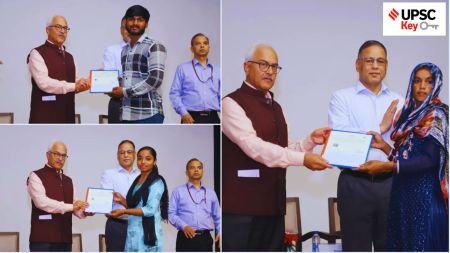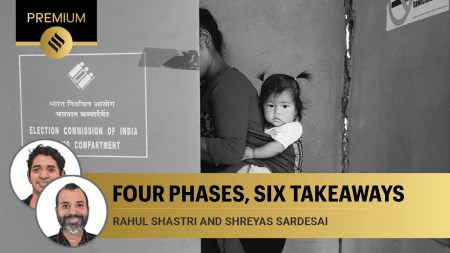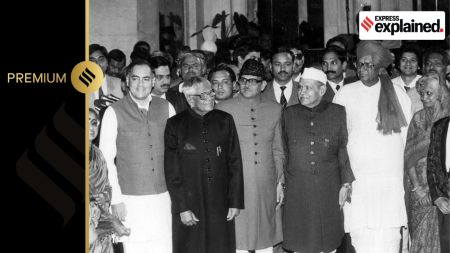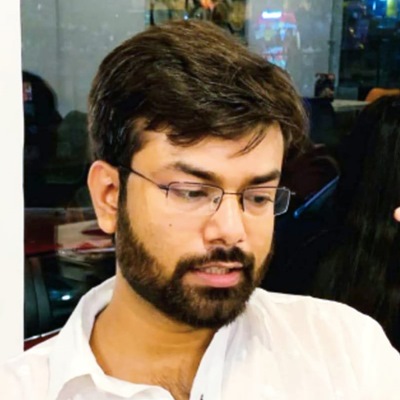- India
- International
UPSC Essentials | Case Study (Week 7) — IAS officer who made education a reality for youth in Jamtara
Read how Jamtara’s district administration and IAS Faiz Aq Ahmed Mumtaz’s innovative solutions steered the youth towards an educated future and away from cyber crime. Don't miss the Post Read Question.
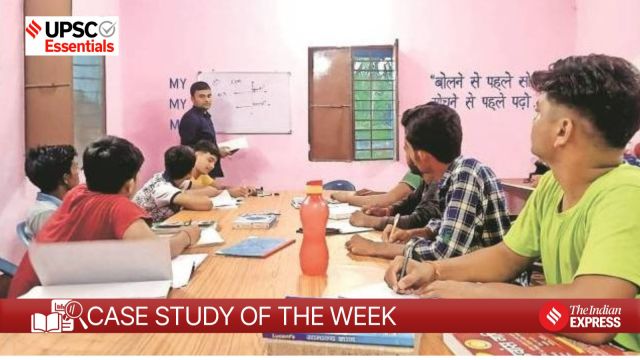 Sub-Inspector Akash Singh teaches at a community library in Nala village, Jamtara. The initiative is a brainchild of IAS Faiz Ahmed Mumtaz. (Express)
Sub-Inspector Akash Singh teaches at a community library in Nala village, Jamtara. The initiative is a brainchild of IAS Faiz Ahmed Mumtaz. (Express)Let’s celebrate governance that turned one district into a fine example. Offering hope, a way out of cyber crime, innovative solutions of IAS Faiz Aq Ahmed Mumtaz and the district administration of Jamtara, known as a hub of cyber crime, made education a reality for youth.
The following case study is framed from a success story recognised at The Indian Express Excellence in Governance Awards. UPSC Essentials of The Indian Express takes you through some inspiring case studies from the area of Governance and Civil Services which not only highlight the problem but also focus on award-winning solutions.
 IAS Faiz Ahmed Mumtaz. (Express photo by Abhinav Saha)
IAS Faiz Ahmed Mumtaz. (Express photo by Abhinav Saha)
Relevance
For Essays, Governance and Ethics section of Mains examination as case studies and example-fodder for answers. Candidates will find it useful for framing replies in interviews and personality tests. This particular case study is relevant to questions related to education and youth related social issues. Moreover, such real-life stories should be read, noted, and applied to remain motivated, inspired and also to create role models.
The Case
Jharkhand’s Jamtara, a district that is associated with cyber crime also had another problem noticed in its Chengaidih panchayat- most girls in the panchayat were dropping out after middle school. Also, youth who aim to clear competitive exams were clueless about how to work towards their goal. They knew associating themself with a coaching institute and a mentor would help but would require a good amount of money to afford guidance. Can a civil servant script change that touches the lives of youth making education a reality for many, and keeping them away from cyber crime?
The Problem
How to discourage youth from cyber crime or any crime for that matter? How to make sure that cyber fraud or phishing doesn’t become a household business led by young minds? Well, the most common answer would be to provide them with education so that they can get good jobs. What if the education is in shambles? Firstly, the problem of girls and youth dropouts is grave. One of the reasons among many is that these panchayats do not have enough educational facilities. This decreases the literacy rate in rural areas, especially female literacy.
The young school dropouts make the region a popular destination for cyber crime investigations by getting involved in running a cyber fraud hub.

Then, some want to study and achieve their goals like government jobs. The challenge is limited resources like infrastructure, mentorship and guidance. Along with the problem of providing study centers a big task is finding mentors who could hold classes for youngsters appearing for competitive exams. Can good governance bring the district out of cyber crime by engaging the youth and pointing them in the right direction?
The Solutions/ Ideas
While on a field visit to Chengaidih panchayat in Jharkhand’s Jamtara district in 2020, Deputy Commissioner Faiz Aq Ahmed Mumtaz noticed these problems and worked with his team to come up with solutions to address this problem.
— Educational facilities: The administration decided to renovate dilapidated government buildings and convert them into libraries. Each of the 118 panchayats of the district now has libraries managed by the gram sabha. The libraries also double up as study centers, with over 16,000 ‘guidance classes’ being held here since the start of the project in November 2020.
“The concern was real and I immediately thought of doing something about it. I wanted to create a culture of reading and study among the youth. We decided to convert unused government buildings into libraries through the convergence of various schemes. The first library started at Chengaidih panchayat and within eight months, libraries were built in all 118 panchayats of the district,” said Deputy Commissioner.
— Funds and maintenance: The district administration used the 15th Finance Commission’s ‘Untied Funds’ to restore the panchayat buildings, with the cost ranging from Rs 60,000 to Rs 2.2 lakh per library. Bookshelves, tables and chairs were funded by officials at the block and panchayat level or through CSR (corporate social responsibility) funds. The district administration also provided books to the centers.
Each library has a panchayat-level Library Maintenance Committee comprising volunteers, and its own bank account to collect contributions from the public. The onus of purchasing more books, paying electricity bills and upgrading the library is on the local community. All the libraries have been geo-tagged and their coordinates and details have been uploaded on the district website.
— Finding mentors for youngsters appearing for competitive exams: The district administration passed an order asking police personnel, junior engineers, panchayat secretaries and gram rozgar sevaks to hold at least one class every week.
Among those who taught at the Nala centre was police officer Akash Singh, who held classes for three hours a day until two months ago, when he was transferred. Singh taught maths to Class 9 and 10 students and ‘Indian Polity’ to those appearing for competitive exams.
What we learn…
— Innovative ideas, making the best use of available resources and a strong will to bring a change can find solutions and make education a reality for many in a district, known as a hub of cyber crime which now has 118 libraries, all in restored panchayat buildings.
— Talking to Manas Srivastava of The Indian Express, Deputy Commissioner Faiz Aq Ahmed Mumtaz said that he used the ‘convergence method’ to implement the idea by bringing together government schemes and public-private contributions.
— He had to find solutions to a challenge for getting youth to use the library. “A quiz competition was held among 31 libraries. It gained some traction… we will need sustained efforts to keep all the libraries operational,” said Mumtaz. He told Abhishek Angad, “It is probably a long shot, but we hope the libraries will help the youth of the district stay away from cyber crime.”
— For scripting change in a district, known as a hub of cyber crime and making education a reality for youth, Faiz Aq Ahmed Mumtaz was awarded The Indian Express Excellence in Governance Award in the Innovative Schemes category.
Post Read Question:
India’s rural youth can give the country an edge — if good governance can focus on the challenges in education they face and get them the jobs they desire. Discuss.
JUST FYI:
About The Indian Express Excellence in Governance Awards
The Indian Express Excellence in Governance Awards attempts to identify and recognise the excellence in innovations at the district level by rewarding the spirit of the district. The Indian Express started the Excellence in Governance Awards (EIGA) in 2019. The Indian Express launched its second edition in 2022. These awards celebrate best practices across a range of 18 categories: Healthcare to Gender & Inclusion; Skill Development to innovative education, energy to agriculture, Start ups and innovation to E-Governance.
PREVIOUS CASE STUDIES:
(Week 1) — IAS officer fights against Naxal violence via development
(Week 2) — IAS officer who made education accessible during the time of crisis
(Week 3) — IAS officer who conducted ‘Sabarimala Yatra’ through strategic planning
(Week 4) —IAS officer who used tech to deliver healthcare to tribals.
(Week 5) —IAS officer who helped transgenders live a ‘life of dignity’
(Week 6) — IAS officer who has a solution to water crisis
Subscribe to our UPSC Newsletter and stay updated with the news cues from the past week.
Share your views and suggestions in the comment box or at manas.srivastava@indianexpress.com
May 17: Latest News
- 01
- 02
- 03
- 04
- 05


